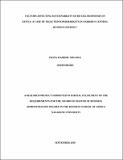Factors affecting sustainability of retail businesses in Kenya: a case of selected supermarkets in Nairobi’s Central Business District

View/
Date
2018-09Author
Mwangi, Fiona Wairimu
Type
ThesisLanguage
enMetadata
Show full item recordAbstract
Many large Kenyan supermarkets have been on the limelight in recent days over financial scandals which have seen the closure of a number of outlets. This research study sought to identify the reasons why this was happening. Whereas supermarkets should be creating employment due to their potential in the market, they are instead leading to thousands of people losing their employment and at the same time they are coming into huge debts that they cannot revive themselves from. This study focused on the extent to which supplier confidence, governance structure and customer loyalty could have contributed to this problem. The research aimed at identifying why the problem was persistent and recommending ways to solve it. The anticipated significance of this study was that there would be improved supplier relations to the supermarkets, effective governance structures and sustained customer loyalty. The study was carried out on selected supermarkets located within Nairobi Central Business District. These included Naivas, Tuskys and Uchumi. The theories that guided the study are Resource Based View and Porter’s five forces. The study made use of descriptive design. The target population included 18 respondents from Naivas supermarkets, 7 from Uchumi supermarket, and 24 from Tuskys supermarkets hence generating a total of 49 respondents. Due to the small size of the population, the research was carried out through a census. Data was collected through administration of questionnaires. The reliability was tested using Cronbach’s Alpha Reliability Coefficient. On average all the constructs registered a Cronbach’s Alpha values above the suggested value of 0.7 thus the study instrument was reliable. Data was analyzed using descriptive statistics and inferential statistics. Descriptive statistics comprised of frequencies, percentages, mean and standard deviations while inferential statistics comprised of multiple linear regression analysis and correlation analysis. The findings revealed that a positive relationship existed between the factors and sustainability. The study also revealed that 60.9% of sustainability of the retail business in Kenya could be influenced by the factors under study. From this study it is evident that at 95% confidence level, the variables produce statistically significant values and could be relied on to explain sustainability of the retail business in Kenya. Hence, customer loyalty, governance structures and supplier confidence respectively influenced sustainability of retail businesses in Kenya. Key recommendations emanating from this study include: Management of supermarkets should encourage their suppliers to deliver their products on a timely basis as specified in their contracts; transparency in business operations; and timely implementation of decisions by management should be encouraged with a view of promoting customer loyalty.
Publisher
Africa Nazarene University
Subject
Retail businessesRetail businesses --Kenya
Sustainability--Supermarkets
Supermarkets -- Nairobi’s Central Business District
